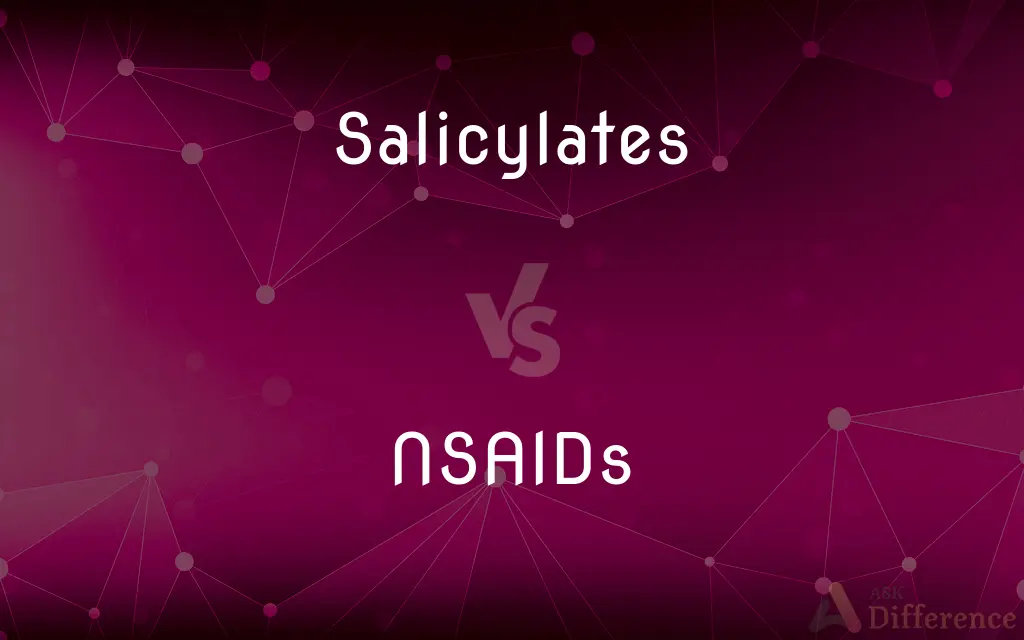Salicylates vs. NSAIDs — What's the Difference?
By Tayyaba Rehman — Published on November 6, 2023
Salicylates are a type of NSAIDs derived from salicylic acid. NSAIDs are anti-inflammatory drugs that reduce pain, fever, and inflammation.

Difference Between Salicylates and NSAIDs
Table of Contents
ADVERTISEMENT
Key Differences
Salicylates are specific compounds derived from salicylic acid. They have analgesic, anti-inflammatory, and antipyretic properties. NSAIDs, or non-steroidal anti-inflammatory drugs, is a broader category of medications that also reduce pain, fever, and inflammation but may include drugs beyond salicylates.
Aspirin is a well-known member of the salicylates group, often used for pain relief and its antiplatelet properties. NSAIDs include a wider range of drugs, such as ibuprofen and naproxen. While all salicylates are NSAIDs, not all NSAIDs are salicylates.
Salicylates function by inhibiting an enzyme involved in the production of pain and inflammation-causing agents in the body. NSAIDs work similarly but can target other enzymes as well, leading to broader mechanisms of action depending on the specific drug.
While salicylates like aspirin have been in use for over a century, the family of NSAIDs has expanded over time to include various drugs with varied potencies and side effect profiles. Regardless, both salicylates and other NSAIDs should be taken with caution, considering their potential gastrointestinal, cardiovascular, and renal effects.
In conclusion, salicylates are a subset of NSAIDs, with both groups effectively addressing pain and inflammation. However, the broader NSAID category offers a more extensive range of medications with varying characteristics.
ADVERTISEMENT
Comparison Chart
Origin
Derived from salicylic acid
Varies, many are synthetic
Examples
Aspirin
Ibuprofen, Naproxen, Aspirin
Function
Inhibit enzymes causing pain & inflammation
Inhibit multiple enzymes related to pain & inflammation
Scope
Subset of NSAIDs
Broader category of anti-inflammatory drugs
Use Duration
Often long-term
Can be short or long-term, depending on the drug
Compare with Definitions
Salicylates
Medications primarily used for pain, fever, and inflammation reduction.
Salicylates have been used for over a century for various ailments.
NSAIDs
A broad category of anti-inflammatory drugs.
NSAIDs include a wide range of medicines, from aspirin to celecoxib.
Salicylates
A specific category within the NSAID family.
While all salicylates are NSAIDs, not the reverse is true.
NSAIDs
Non-steroidal anti-inflammatory drugs.
Ibuprofen and naproxen are popular NSAIDs.
Salicylates
Compounds derived from salicylic acid.
Aspirin is one of the most common salicylates.
NSAIDs
Non-steroidal medications with varying potencies and side effect profiles.
Due to potential side effects, NSAIDs should be taken as directed.
Salicylates
Chemical substances with analgesic, antipyretic, and anti-inflammatory properties.
Salicylates are often prescribed for their multi-faceted therapeutic benefits.
NSAIDs
Medications that reduce pain, fever, and inflammation.
NSAIDs are commonly used for conditions like headaches and joint pain.
Salicylates
Drugs that inhibit certain enzymes linked to pain and inflammation.
Salicylates effectively manage symptoms of arthritis.
NSAIDs
Drugs that target enzymes related to inflammation and pain processes.
NSAIDs offer relief from symptoms without the use of steroids.
Salicylates
A salt, ester, or anion of salicylic acid.
NSAIDs
A nonsteroidal anti-inflammatory drug, such as ibuprofen.
Salicylates
Plural of salicylate
Common Curiosities
Are all NSAIDs also salicylates?
No, while all salicylates are NSAIDs, not all NSAIDs are salicylates.
Is aspirin a salicylate?
Yes, aspirin is a well-known member of the salicylates group.
What is the primary function of salicylates?
Salicylates inhibit enzymes related to pain and inflammation processes.
Are salicylates synthetic or natural?
Some salicylates, like aspirin, are synthesized, but they are derived from the natural compound salicylic acid.
How do NSAIDs work in the body?
NSAIDs work by inhibiting enzymes involved in pain, fever, and inflammation.
Can salicylates be used for fever reduction?
Yes, salicylates have antipyretic properties and can reduce fever.
What are some common side effects of NSAIDs?
NSAIDs may cause gastrointestinal, cardiovascular, and renal side effects.
How long have salicylates been in use?
Salicylates, like aspirin, have been in use for over a century.
Which is broader in scope, salicylates or NSAIDs?
NSAIDs are broader in scope, encompassing salicylates and other compounds.
What are salicylates?
Salicylates are compounds derived from salicylic acid used for pain, fever, and inflammation.
Do all NSAIDs work the same way?
While all NSAIDs reduce inflammation, their mechanisms and side effect profiles may vary.
What does NSAIDs stand for?
NSAIDs stand for non-steroidal anti-inflammatory drugs.
Are there any risks associated with prolonged use of salicylates?
Yes, prolonged use can lead to gastrointestinal issues, bleeding risks, and other side effects.
Should one consult a physician before starting on salicylates or NSAIDs?
Absolutely, a healthcare professional should always be consulted due to potential side effects and interactions.
Can both salicylates and NSAIDs be used for arthritis?
Yes, both can effectively manage arthritis symptoms.
Share Your Discovery

Previous Comparison
Magnesium Glycinate vs. Magnesium Gluconate
Next Comparison
Gram-positive Bacteria vs. Gram-negative BacteriaAuthor Spotlight
Written by
Tayyaba RehmanTayyaba Rehman is a distinguished writer, currently serving as a primary contributor to askdifference.com. As a researcher in semantics and etymology, Tayyaba's passion for the complexity of languages and their distinctions has found a perfect home on the platform. Tayyaba delves into the intricacies of language, distinguishing between commonly confused words and phrases, thereby providing clarity for readers worldwide.
















































